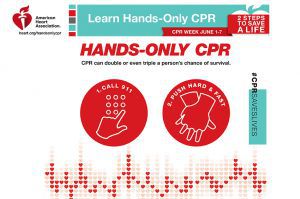
American Heart Association urges the public to learn CPR and act in cardiac emergencies to help save lives
DALLAS, TX--Do you know the two simple steps of Hands-Only CPR? Performing CPR can double or even triple a cardiac arrest victim’s chance of survival. Higher bystander CPR rates have been linked to greater survival rates after a cardiac arrest but currently, bystanders only perform CPR 37% of the time.
National CPR and AED Awareness Week, June 1–7, aims to raise awareness and increase the number of people who perform CPR in cardiac arrest emergencies. Each year, more than 350,000 out-of-hospital cardiac arrests occur in the United States. About 90% of people who suffer out-of-hospital cardiac arrests die. The American Heart Association, the world’s leading voluntary organization dedicated to building healthier lives, free of cardiovascular diseases and stroke, is working to increase the number of bystanders who use CPR in an emergency.
In nine airports throughout the country, Hands-Only CPR training kiosks are operated by the American Heart Association and supported by Anthem Foundation, the philanthropic arm of Anthem Inc. Travelers can get trained in Hands-Only CPR in about five minutes while they wait for their flights. Each kiosk has a touch screen with a short video that provides an overview of Hands-Only CPR, followed by a practice session and a 30-second test. With the help of a practice manikin, the kiosk gives feedback about the depth and rate of compression, as well as proper hand placement – factors that influence the effectiveness of CPR.
There are an additional 35 kiosks across the United States, 18 of which are located at several U.S. airports. More than 200,000 people have been trained across all the kiosks. Kiosk visitors can select to do the training in English or Spanish. The training also has closed captioning to make the instruction available to everyone.
Furthermore, research has shown that surveillance and reporting are the foundational element to improve patient outcomes from cardiac arrest. The Cardiac Arrest Registry to Enhance Survival (CARES) covers a population of over 124 million people, includes a total of over 350,000 records and approximately 63 participating communities in 18 states, and 23 state-based registries, 1,400 EMS agencies and over 1,900 hospitals. In support of the U.S. Department of Health and Human Services goals to have all 50 states participating in a national registry within two years and double survival from witnessed out-of-hospital cardiac arrest, the American Heart Association has committed $500,000 over the next three years to help expand the registry to new states. CARES participants can benchmark their performance to identify opportunities for quality improvement and thus increase cardiac arrest survival in their community.
SOURCE: American Heart Association
